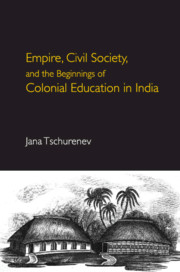Book contents
- Frontmatter
- Dedication
- Contents
- List of Figures
- List of Tables
- List of Abbreviations
- Acknowledgements
- Introduction: Empire Civil Society, and Educational Transformation in India
- 1 A Colonial Experiment in Education, Madras, 1789–1796
- 2 Education of the Poor, 1805–1813
- 3 Missionaries, Empire, and the Cause of Universal Education, 1792–1824
- 4 Race, Class, and Gender: The Social Agenda of Education, 1809–1830
- 5 Rules and Numbers: Transforming Rural Education, 1814–1830
- 6 Intellectual Conquest: Education Societies, ‘Useful Knowledge’, and the Bengal Renaissance, 1817–1854
- 7 Civil Society, Government, and Educational Institution-Building, Bombay Presidency, 1819–1882
- 8 Teaching the Marginalized: Universal Education and the Politics of Inequality, 1789–1937
- Conclusion: The Emergence of Public Elementary Schooling in an Imperial Frame
- Bibliography
- Index
Introduction: Empire Civil Society, and Educational Transformation in India
Published online by Cambridge University Press: 26 April 2019
- Frontmatter
- Dedication
- Contents
- List of Figures
- List of Tables
- List of Abbreviations
- Acknowledgements
- Introduction: Empire Civil Society, and Educational Transformation in India
- 1 A Colonial Experiment in Education, Madras, 1789–1796
- 2 Education of the Poor, 1805–1813
- 3 Missionaries, Empire, and the Cause of Universal Education, 1792–1824
- 4 Race, Class, and Gender: The Social Agenda of Education, 1809–1830
- 5 Rules and Numbers: Transforming Rural Education, 1814–1830
- 6 Intellectual Conquest: Education Societies, ‘Useful Knowledge’, and the Bengal Renaissance, 1817–1854
- 7 Civil Society, Government, and Educational Institution-Building, Bombay Presidency, 1819–1882
- 8 Teaching the Marginalized: Universal Education and the Politics of Inequality, 1789–1937
- Conclusion: The Emergence of Public Elementary Schooling in an Imperial Frame
- Bibliography
- Index
Summary
I say without fear of my figures being challenged successfully, that today India is more illiterate than it was fifty or a hundred years ago …, because the British administrators, when they came to India, instead of taking hold of things as they were, began to root them out. They scratched the soil and began to look at the root, and left the root like that, and the beautiful tree perished. The village schools were not good enough for the British administrator, so he came out with his programme. Every school must have so much paraphernalia, building, and so forth. […] This very poor country of mine is ill able to sustain such an expensive method of education. Our state would revive the old village schoolmaster and dot every village with a school both for boys and girls.
Empire, Civil Society, and the Beginnings of Colonial Education in India revisits the radical educational transformation that took place in the nineteenth century. It does so by looking at formal, institutional elementary instruction. In a slow and uneven process, the diverse landscape of indigenous knowledge transmission gave way to a colonial-modern education system. This was socially a highly relevant process, and it is not surprising that it became subject to intense political and historiographical debate. While the agents of empire themselves opened a discourse that presented their endeavours as a progressive expansion and a qualitative improvement of education, this was challenged by a nationalist counter-narrative. In the nationalist perspective – exemplified by M.K. Gandhi's above-cited statement – the British cut off the roots of the ‘beautiful tree’ of a culturally meaningful and socially embedded indigenous education. The nationalist hope, however, of ‘reviving’ the pre-colonial institutions – idealized as they appeared in hindsight – was impossible to realize. Even if the colonial state had clearly failed to universalize schooling, there was no reverting to the mode of ‘the old village schoolmaster’. The colonial education system, and the pedagogical culture inscribed within, formed the inevitable basis of any further reform efforts. The building of ‘national education’ for an independent India, designed from the 1890s onwards as an alternative to colonial education, took place within the once-established modern structure.
It is the emergence of this colonial-modern structure that this book explores – a new pedagogical culture, new institutional arrangements, and shifts in the social accessibility of literacy skills.
- Type
- Chapter
- Information
- Publisher: Cambridge University PressPrint publication year: 2019



